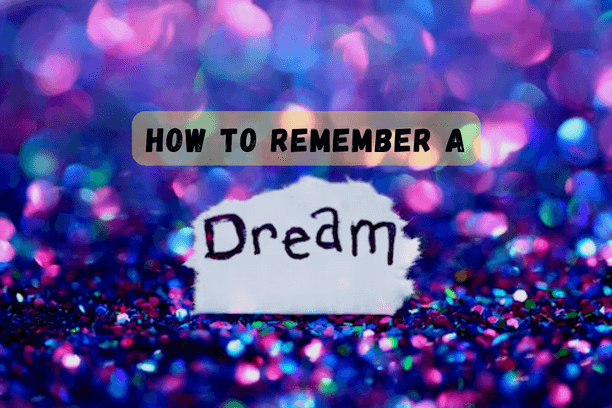
How to remember your dreams? Many people ask this question. But the best way to remember dreams is to relate them to reality. The truth is that remembering dreams happen in our sleep, but we can’t make up for this without the help of our subconscious mind, which does not sleep. There are a few techniques often recommended by sleep scientists that you can use for better dream recall and help you understand what happened in those dreams.
A Guide to Recalling Your Dreams
-
Recall
First, you can make a conscious effort to remember them. You can do this by consciously thinking about the dream as you get up in the morning and throughout the day. This will help you stay focused on the dream, making it more likely that you’ll remember it later.
You may practice a muscle relaxation exercise. This helps you release tension in your body and brain, which makes it easier to recall your dream. If you’re unfamiliar with this technique, try doing it while lying down in bed or standing in front of a mirror in a quiet place where you won’t be disturbed.
-
Visualize
Making a conscious effort to recall a dream can be difficult. In that case, you may use visualization as another way to concentrate on recalling your dream. Visualization involves imagining important things: what they look like, how they feel, what they smell like—whatever will help you recall more clearly what happened in your dream!
-
Wake up every 4.5 hours
Next, you can take advantage of the fact that REM sleep is when we’re most prone to dreaming. A 2019 study [*] found that REM sleep impairs our capacity to form memories. That might shed some light on why we frequently forget our dreams.
If you wake up during REM sleep, try going back to sleep! It’s not unusual for people who wake up during REM sleep to fall back into REM themselves—try it out if you want! WikiHow suggests that waking up after every 4.5 hours is one of the easiest ways to remember a dream.
-
Meditate
Third, try relaxation techniques like guided imagery or meditation before bedtime—those are great ways of ensuring that your mind is ready for dreaming when it gets there!
That said, one of the best ways to recall your dream is through meditation. You can do this by sitting quietly in a comfortable position and focusing on the feeling of relaxation that is settling into your body. You may also want to close your eyes and focus on the sound of your heart beating or the sensation of air passing over your face.
Once you feel that you have calmed, take some deep breaths and allow time to think back over what happened in your dream. If there are any details that you cannot remember, then repeat them out loud until they come back to you. It’s also helpful if you write down any important details from the dream when you wake up so that they are still fresh in your mind when you go back to sleep later that night!
-
Try lucid dreaming
One of the most effective ways to remember a dream is to have lucid dreams. It is when you are aware that you are dreaming and you can control your actions in the dream.
To lucid dream, first, you need to stay awake for a long time in a state of relaxation. You can do this by taking a bath or just sitting on your bed with no distractions. When you feel like falling asleep, try to keep awake. If you fall asleep during this time, just go back to the place where you were trying to stay awake and try again. You may have to repeat this several times before being able to lucid dream.
Once you are lucid dreaming, there are many things that you can do in your dreams: fly, change into different animals, talk with people who aren’t there, or even travel around different worlds!
Here’s how to have lucid dreams:
- Start by making sure you’re in a comfortable place and are able to get some sleep.
- Try meditating or concentrating on something that is relaxing for you, like a favorite song or smell.
- When you feel sleepy, start counting backward from 100 in increments of five until you fall asleep (this can take anywhere from 10 minutes to an hour).
- Once you’re asleep, imagine yourself waking up in your dream world and talking or acting out whatever it is that interests you most about the dream—the characters or setting, perhaps? You don’t have to do anything at this point—just listen as things unfold around you in your mind’s eye, remembering every detail of what happens next when you wake up again!
Here are some more tips on remembering a dream
Dream recall is a tricky task to master. If you’re not sure how to remember your dreams, here are some tips:
- Have a regular bedtime and try to sleep in the same room with your partner or family members so you can talk about the day’s events before going to sleep.
- Don’t skip meals, and don’t take caffeine before bedtime—it can make it harder for you to fall asleep and keep your mind off your dreams.
- Try anything that relaxes you and makes you feel warm and comfortable before going to bed, like taking a hot bath or reading a book by candlelight (but don’t read your book too close to bedtime!).
Is it possible to remember a dream?
It’s not easy to remember dreams, but it is possible. In fact, many people remember dreams unconsciously.
Dreams are a part of our nature and can be traced back to an early stage of our lives. They are a function of the brain. The first stage of dreaming occurs in the infant’s brain and then continues throughout childhood (and into adulthood). This is when we learn about our world through our senses. We see, hear, smell, taste, and touch things in our environment.
According to experts at the Mind Research Network at the University of California in San Diego, “The brain uses two types of sleep—REM (rapid eye movement) sleep and NREMS (non-REM) sleep—to process information during non-REM periods.” This means that we can use our memory to recall details from dreams if we focus on them during waking hours.
A dream of being naked – what does it mean?
It’s true that many people have reported having dreams in which they were naked or drove a car, but these are not the dreams that we’re talking about here. Generally speaking, dreams are just random images and sounds that flash through our minds during sleep. It’s possible to have some sort of meaning behind them—I’ve read about people who dreamt of their future selves, for example—but it’s rare and difficult to pin down the exact meaning.
Do we always dream when we sleep?
According to Healthline, all people dream when they sleep [*]. Some remember, and some don’t. In fact, dreaming is one of the most common activities in the human brain and one that we engage in all the time.
Recent studies suggest that dreaming occurs at least 80% of the time during REM sleep, with some people reporting that their dreams last up to 30 minutes each time they sleep. First, let me explain to you the science of dreaming.
Dreams are made up of images and thoughts that are jumbled together and then put into words by your brain while you’re sleeping. You’re sleeping because your brain is taking a break from all the thinking it has to do during the day so that it can focus on dreaming—and dreaming is when we get our best ideas!
So even though you might not remember any of your dreams, they’re still happening. Your brain is just doing some work in the background while you sleep: It’s trying to figure out what will happen next in case something goes wrong in real life.
But don’t worry! No matter how busy your brain gets during the day, it always has time for dreaming at night—which means there’s plenty of time left over for planning ahead!







Your article helped me a lot, thanks for the information. I also like your blog theme, can you tell me how you did it?